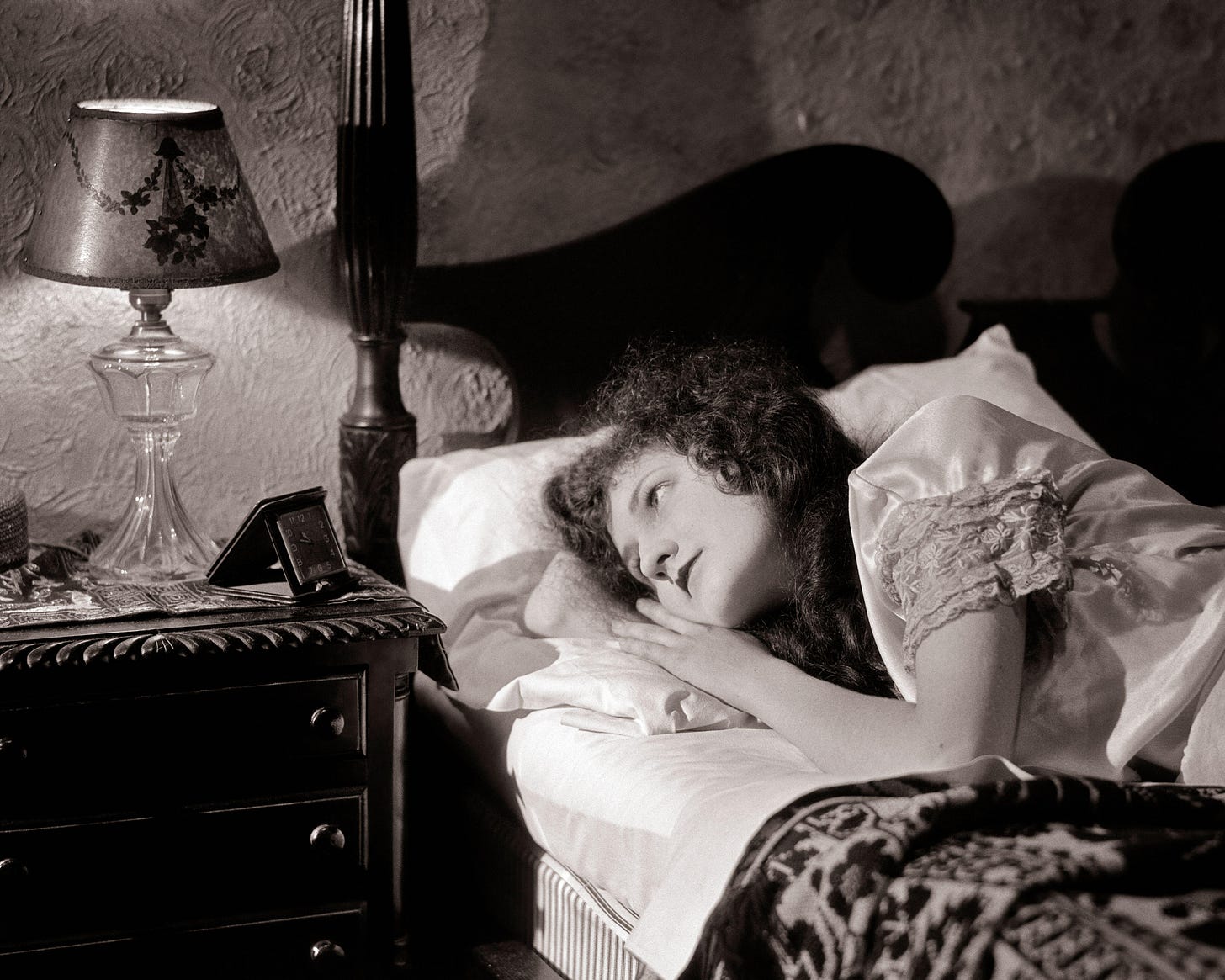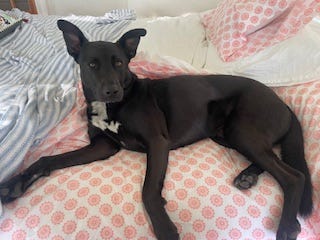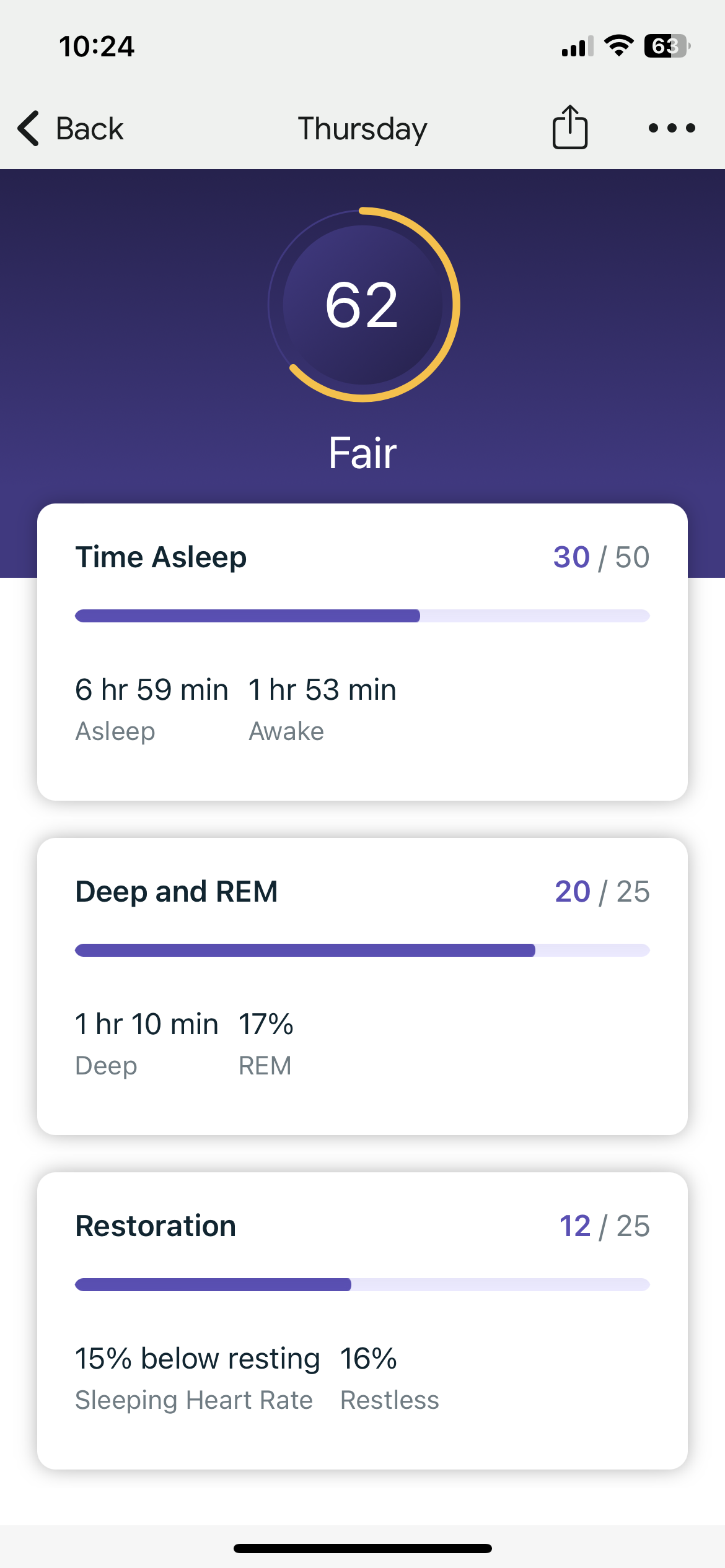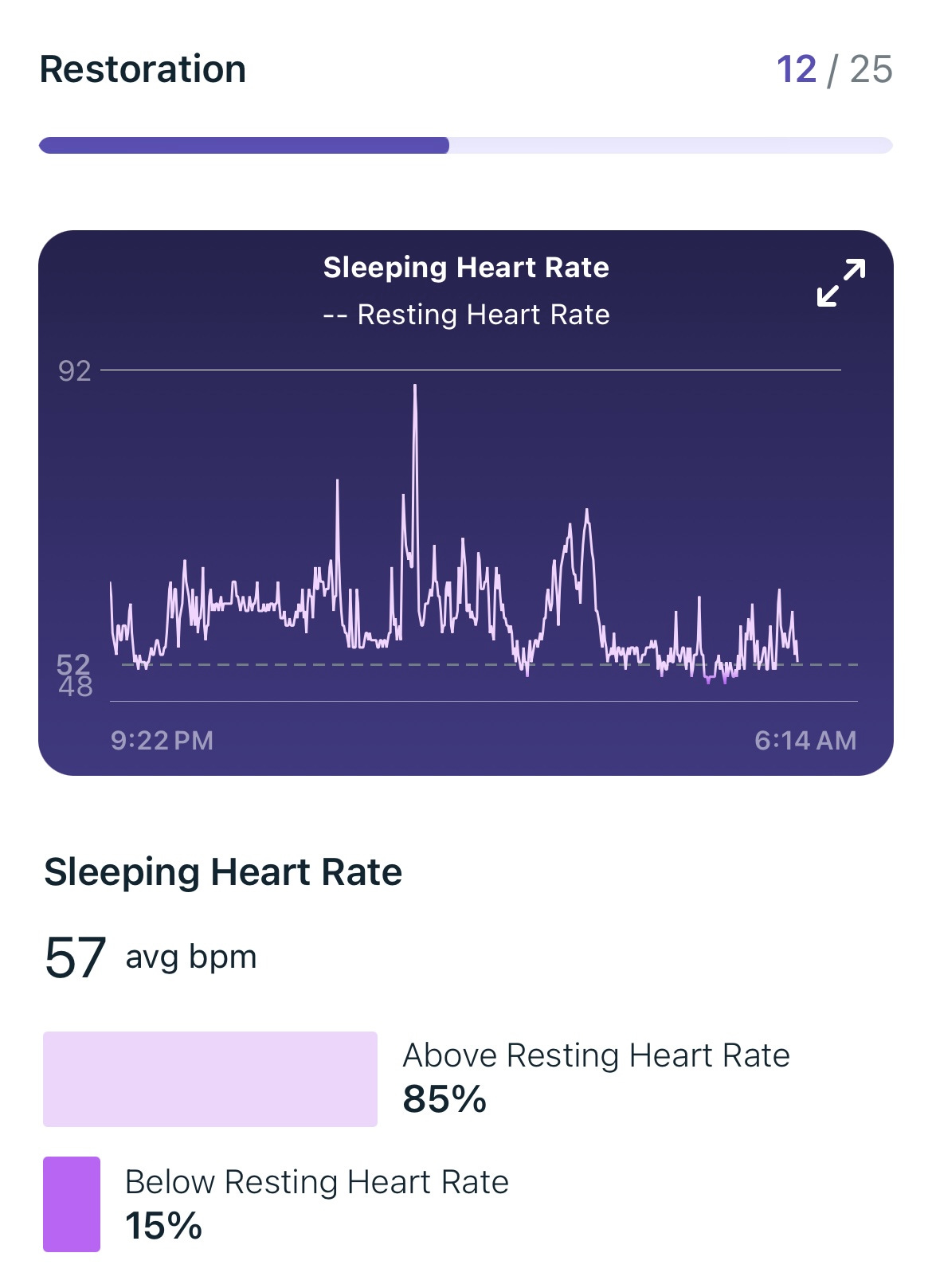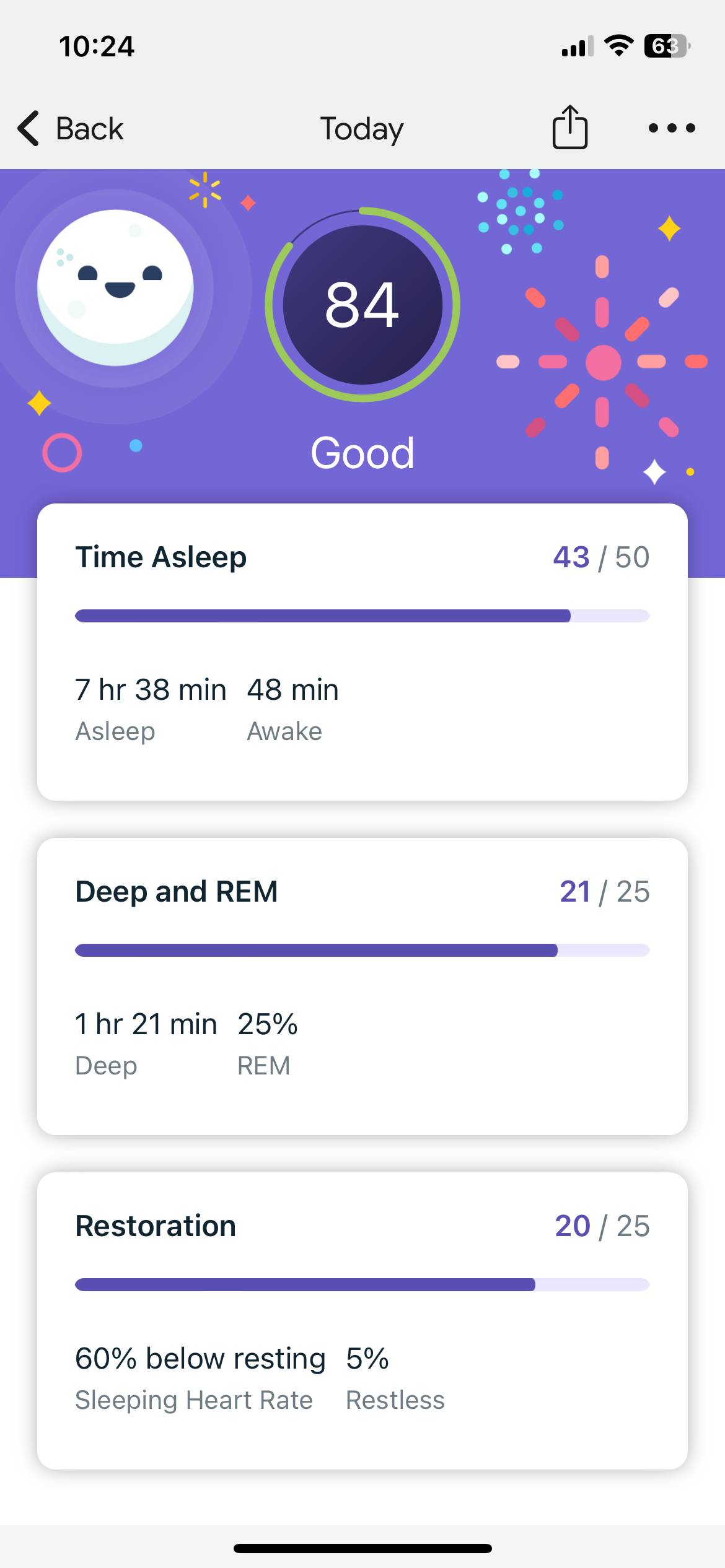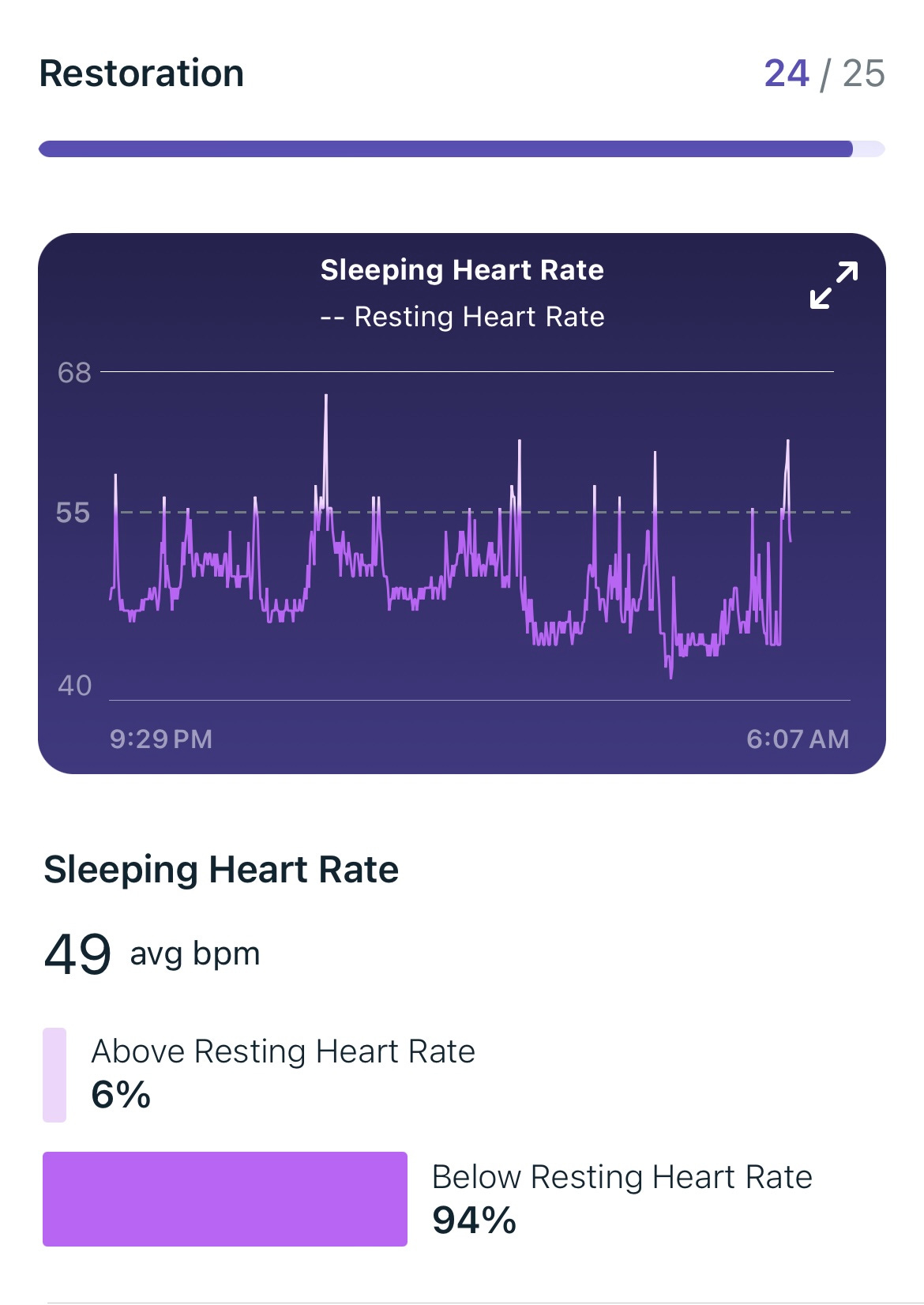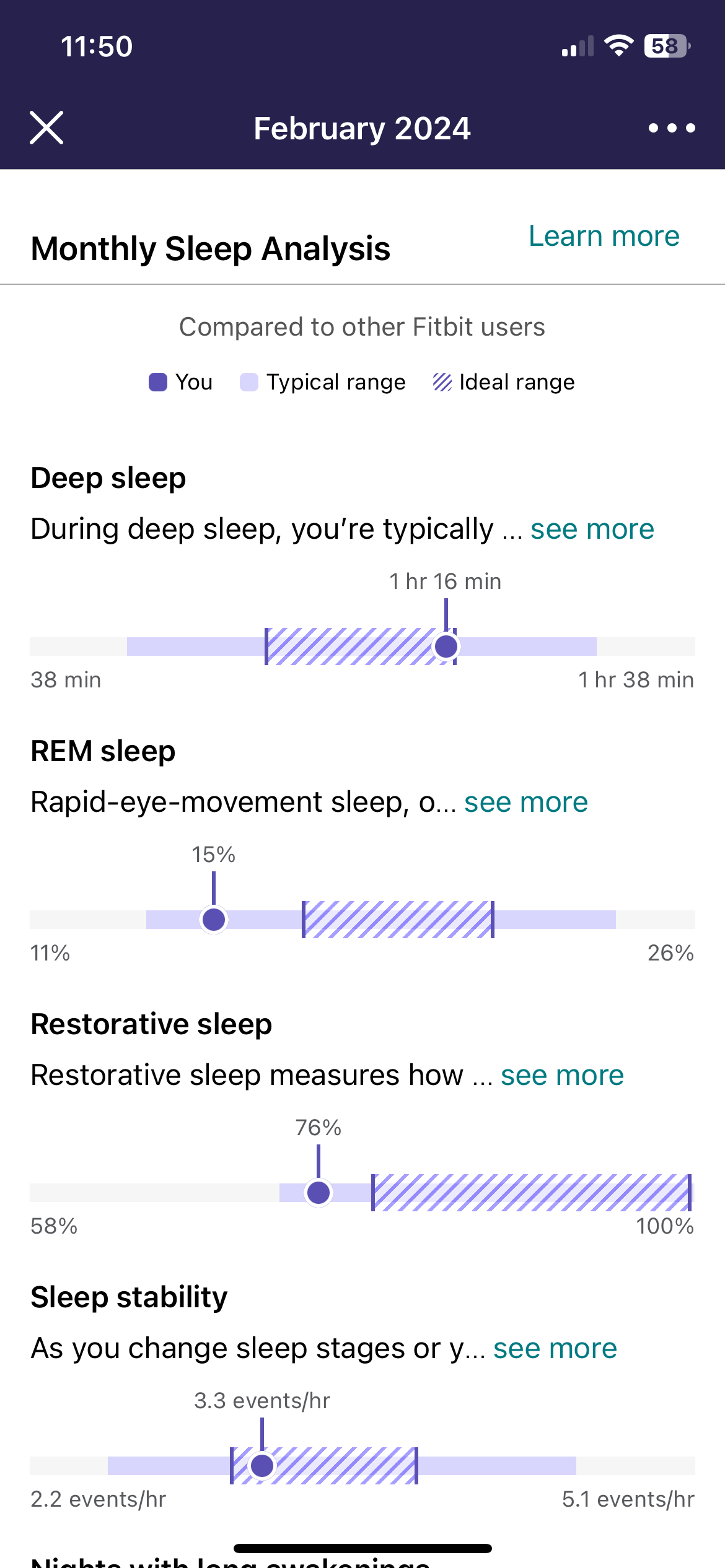I'm Doing a Sleep Experiment on Myself, and You Can Too!
A few things I'm trying to improve my stupid sleep score
What I’m writing about here:
Podcast bros’ obsession with sleep quality
How anxiety affects sleep quality
What makes a good sleep routine
What makes a good sleep environment
Cute dog exceptions
Tracking sleep scores with my precious fitbit
How I’m experimenting to improve my sleep score
3 methods to try when I can’t sleep
If you listen to any health podcasts – Huberman Lab and The Drive with Peter Attia are two that are consistently at the top of the charts – they are obsessed with sleep: how it works, why we need it, how to get more of it. According to these guys getting enough high quality sleep is better than any supplement imaginable, better than exercise, better than sex. Okay maybe not better than sex for Huberman, since he was recently the subject of a New York Mag article that detailed how he was dating six women at once who didn’t know about each other. I knew that guy wasn’t perfect! The point is, sleep impacts everything, from your mood to your metabolism, relationships, disease risk, and on and on.
From my limited friend and relationship sample, it seems like there are two types of people: those that have a lot of trouble sleeping and those that can fall (and stay) asleep through anything. I fall into the former category, Kelli falls into the latter. There are a few exceptions: Drinking exacerbates trouble sleeping for both of us, and apparently everyone else. And according to the podcast bros (PB) certain things like weight and smoking and sleep position and apparently your head and neck shape (??) can influence whether you get sleep apnea or other conditions that lead to poor quality sleep.
But this newsletter is called Anxiety Party, so I’m going to focus on the main cause of my sleep issues, which are often related to anxiety: racing, worried thoughts, and a general feeling of holy shit I am so awake all I can do is lay here in the dark with my eyes wide open trying desperately not to think about how awake I am. It’s a losing battle. If you know you know.
I’ve noticed the stretches of time where this would get really bad coincided with the milder anxiety triggers in my life – if we are waiting for initial feedback from a client presentation or if I watch a TV show about the world ending over and over (thanks 3 Body Problem!), I find myself in a replay loop: going over the situation, scanning it for errors or imperfections or things we/I should have done better; and then somehow spiraling into the unknowability of the cosmos and planets and sun flares and meteors that remind me of Armageddon starring Bruce Willis, oh god, Bruce Willis, frontotemporal dementia! My. Brain. Is. Awake.
Keys to Good Sleep: Routine, Environment, and (Not) Drinking
So what to do? According to the PB and also a therapist named David that my health insurance assigned me last year because I was a top customer, establishing a sleep routine is a way to get better sleep. That is, the same way that you have a morning routine, you should have a night routine. So instead of, oh, say drinking three glasses of wine and passing out on the couch watching RuPaul’s Drag Race, and then promptly going to bed and scrolling on Reddit to read what everyone thought of RuPaul’s Drag Race, which is a routine of sorts, you should be mindful about winding down the day and getting into bed. You should try not to drink or eat anything 30 minutes to an hour before we go to bed and find a relaxing activity to transition to sleep, like a meditation, gentle music, or reading a book. (David encouraged me to listen to something called binaural beats on YouTube, which negated the no screens in bed recommendation so I didn’t do it – but you could!) And ABOVE ALL VERY VERY IMPORTANT AND BAD FOR SLEEP is that you should NOT be looking at your phone.
In addition, your sleep environment is also very important: Get blackout curtains to block light, a sound machine or earplugs to block noise, and the means of creating an optimal temperature that’s between 68 and 72 degrees. The best sheets for sleep depend on whether you “sleep hot” (cotton, linen, or bamboo) or “sleep cool” (flannel or microfiber). And the best dogs for sleeping include none, because dogs, even if they are curled up like a cinnamon bun, definitely disrupt sleep.
Unfortunately, we live about 200 feet from the Brooklyn Queens expressway (noisy), have broken blinds and various plugged in appliances in our tiny apartment (bright), and a 60 lb. mattress topper who takes up roughly a fourth of our bed (dog).
Tracking Sleep: The Cause of, and Solution To All Life’s Problems
I’m able to track my “sleep score” on my fitbit, which is mostly a blessing but also a bit of a curse as it’s easy to become obsessed with it. I find the benefits (ability to analyze what impacts my sleep) outweigh the negatives (you have to wear the tracker all the time and keep it charged, it can be slightly innaccurate, and tracking sleep is a premium benefit that might cost a bit more).
*If you’re interested, 2% with Michael Easter has a great roundup of fitness trackers and analyzes their accuracy.
The sleep score on my fitbit is comprised of three parts, all measured more or less by tracking changes in your heart rate:
time asleep
deep and REM sleep amounts
“Restoration” which basically is just tracking my resting heart rate to see if it’s above normal while I sleep.
After tracking my sleep for over a year, plus just general self-observation, I can confidentally say my sleep score is typically most impacted from having more than 2 drinks the night before.* But sometimes, it’s bad if I’ve had no alcoholic drinks the night before but am anxious about something and can’t sleep.
If my sleep score is “bad” aka 70 or below on my fitbit, I’m tired, irritable, and restless the next day. I’m not obsessed with the numbers so much as how I feel, and how I feel the next morning is consistently reflected in the scores.
Drinking any alcohol makes my resting heart rate go up for some portion of the night, but more than two drinks typically makes it elevated the entire night, leading to a terrible restoration score.
If my sleep score is “good” aka if I’ve slept through the night and get around 7 hours or more of sleep, I feel GREAT in the morning. I can run faster, I’m in a better mood, and can concentrate better at work.
In the good sleep score, I spent way less time awake at night, with less restlessness. And even though I got about the same amount of deep sleep, I got 10% more REM sleep than the bad score and, most tellingly, my restoration score is completely reversed.
And that’s just the tip of the sleep score iceberg. Fitbit has a thing where they assign you a “sleep animal” after each month of sleep tracking (I’m usually a hedgehog but sometimes a tortoise?) which I find less helpful than just looking at the numbers. Regardless, all of this isn’t about “winning” sleep or getting 100 (I don’t even know if that is possible), it’s about feeling good and staying healthy, and having ways to actively impact my mood, capacity for exercise, and overall health. So since the big C diagnosis, I’ve been slowly experimenting with improving my sleep situation.
Changes I’ve made to get better sleep
We have a noise machine that is able to somewhat drown out the trucks on the BQE, and at the beginning of 2024 Kelli bought both of us some sleep masks that block out light. If I feel “wired” or on edge, I have some melatonin chews that help make me drowsy but I don’t like to take them every night. I try not to drink alcohol 3-4 nights a week, with the occasional exception for a social event. But I’ve also definitely had some bad habits creep back in. If the day’s been particularly stressful and it’s near the weekend, I’ll have more than 2 drinks thinking it will take the edge off. And I’ve gotten lazy about scrolling my phone before bed. According to my February sleep metrics (once you get past the cute tortoise illustration), there’s room for improvement: I could be getting more REM sleep and more restorative sleep, which is the main area I want to focus on.
What I’m trying to positively impact my sleep
I’m not doing terrible, but I could be doing better. And I do feel kind of silly knowing exactly what can make my sleep, and therefore my mood, health, and cancer risk improve and NOT doing it. So here’s what I’m committing to for the next three months:
Not looking at my phone starting 30 minutes before bedtime
Cutting out alcohol Sunday through Wednesday, no exceptions
Drinking no more than two alcoholic drinks at night Thursday, Friday, and Saturday (and trying to stick to low-alcohol beer or cider instead of wine)
Going to sleep before 10 unless I have a social event
Reading a physical book for 20 minutes in bed instead of looking at my phone
Using sound machine and sleep mask
Taking melatonin supplements if the day has been particularly stressful or I feel wired, anxious, or awake despite my routine and not drinking
Sleep methods to try when all else fails
If I’ve followed all the rules above and STILL find myself lying awake at night, I looked up some methods to try to fall asleep. Sidenote: these links are from a Sleep Foundation site that’s not affiliated with the non-profit foundation in D.C. and is probably producing content to sell some sleep products. However, I couldn’t find an article about equally cool sleep techniques on the actual National Sleep Foundation website. Such is capitalism.
The techniques listed by not-the-actual-sleep-foundation-sleep-foundation are all variations of controlled breathing, progressive muscle relaxation, and imagery. Here are three that I want to try next time I can’t fall asleep:
Body scan meditation:
Lie in bed face up with your hands at your side.
Spend a few moments practicing controlled breathing.
Direct your attention to sensations in your feet without labeling them as good or bad.
Breathe deeply and imagine the breath traveling all the way to your feet. As you exhale, let your feet dissolve from your awareness, and direct your attention to your ankles and calves.
Move your attention progressively upward until you reach the head.
Finish the practice by becoming aware of your body as a whole and breathing deeply.
The “Military Method” that soldiers use to “fall asleep anywhere.” Badass!
Relax your face, moving from your forehead to your jaw.
Release any tension in your shoulders and arms, allowing them to rest at your sides.
Take a slow, deep breath and then gradually exhale.
Relax your legs, beginning with the hips and thighs and working your way to the tips of your toes.
With your eyes closed, imagine a peaceful scene. If you get distracted, repeat a simple phrase in your mind, like “be still.”
Autogenic training a.k.a. Self-hypnosis. Whoa.
To practice, lie in bed with your eyes closed and recite sets of six to 10 phrases for each of the following sensations:
“Warmth in the arms and legs”
“Heaviness in the arms and legs”
“A slow, steady heartbeat”
“Slow, calm, regular breathing”
“Softness and warmth in the belly”
“A cool forehead”
And that’s it - that’s what I’m committing to for the next three months. If you have any tips or tricks for conquering sleep demons, let me know, and I’ll report back in July to see the results.
Anxiety Party Roundup!
Current Anxiety Trigger:
Earth being inadvertently and randomly sucked in to another’s star’s orbit.
Current Anxiety Relief:
Rupaul’s Drag Race Season 16
Current Anxiety Soundtrack:
See ya!


